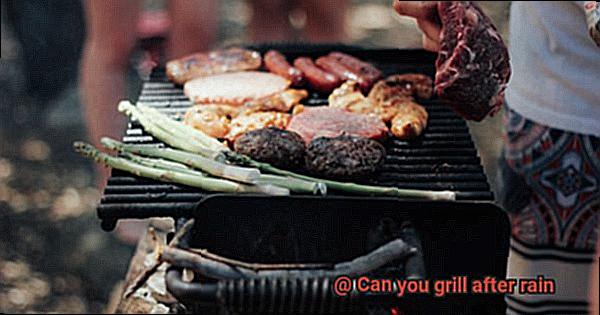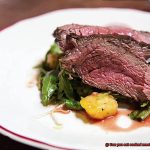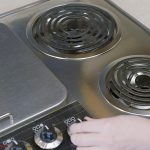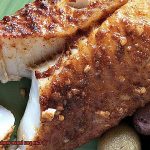Ah, the sweet smell of summer barbecues. There’s nothing quite like it. But what happens when Mother Nature decides to rain on your parade? As a seasoned grill master, you know that grilling after a downpour is not as simple as a yes or no answer. You don’t want to risk ruining your meal, but you also don’t want to cancel your plans altogether.
That’s where we come in. In this blog post, we’ll explore the science and safety behind grilling after rain. We’ll give you tips and tricks for ensuring your barbecue goes off without a hitch, even if the weather doesn’t cooperate. We’ll discuss the risks of grilling on a damp surface and provide best practices for keeping your food safe.
We know you have questions, like how long should you wait after rain before firing up the grill? And what do you do with soggy charcoal? Don’t worry; we’ve got answers to those too.
So let’s get started. Whether it’s sunny skies or pouring rain, we’re here to help you enjoy your cookout to the fullest.
Contents
Why Grilling After Rain is a Concern
However, there are several concerns you should be aware of when grilling after rain.
First and foremost, grilling after rain can be dangerous due to the risk of electrical shock. Water and electricity do not mix well, and if your grill is wet, it could result in a serious accident. To prevent this, make sure to dry off your grill before starting. Use a dry cloth or paper towels to wipe down the grates and remove any excess moisture. It’s also a good idea to cover your grill when not in use to protect it from rain and other elements.
Another concern when grilling after rain is the impact it can have on the taste of your food. Rain can dilute or wash away any seasoning or marinade you have applied to your meat, resulting in a bland and tasteless meal. To avoid this, make sure to apply your seasoning or marinade right before cooking and keep the lid closed as much as possible during cooking. This will help to seal in the flavor and prevent moisture from affecting the taste.
Additionally, the moisture from the rain can make it more difficult to get your grill up to temperature, which can lead to uneven cooking or undercooked food. To avoid this, consider using a chimney starter or lighter fluid for charcoal grills and preheat gas grills for at least 10-15 minutes before cooking. This will help to ensure that your grill is hot enough to cook your food properly.
Lastly, grilling after rain can also damage your grill. If you have a gas grill, excess moisture can cause rust and corrosion to build up over time, resulting in a shorter lifespan for your grill. Similarly, if you have a charcoal grill, the moisture can cause the charcoal to become damp and difficult to light. To prevent damage to your grill, make sure to dry it off after use and store it in a dry place.
Prepping the Grill for Rain
There’s nothing quite like the sizzle of your favorite food cooking on the grill. But when unexpected rain showers roll in, your grilling plans can quickly go up in smoke. That’s where prepping the grill for rain comes into play – it’s the key to ensuring that your grill remains safe, functional, and ready to use no matter the weather.
Here are some essential steps you can take to prep your grill for rain:
Step 1: Clean and Dry Your Grill
Before storing your grill, give it a thorough cleaning. Start by removing any debris or leftover food particles from the grates and burners. Then, use a wire brush to scrub away stubborn bits of grime. Once your grill is clean, dry it completely with a towel or let it sit out in the sunshine for a while to evaporate any remaining moisture.
Step 2: Check Your Fuel Source
If you’re using charcoal, make sure it’s stored in a dry place to prevent moisture from affecting its lighting and heat distribution. Wet charcoal can be tough to ignite and may cause uneven cooking. If you’re using propane, ensure that the tank is tightly sealed and kept away from standing water. This will help avoid any damage or safety issues.
Step 3: Invest in a Grill Cover
A high-quality grill cover is an excellent investment for any grilling enthusiast. It will protect your grill from rain, wind, and other elements that can cause rusting and damage over time. Look for a cover that fits your grill properly and is made of durable material that can withstand harsh weather conditions.
By following these simple steps, you’ll be able to keep your grill in top shape and enjoy delicious grilled meals all year round – even during unexpected rain showers. Here’s a quick recap of what we covered:
- Clean and dry your grill thoroughly
- Check your fuel source (charcoal or propane) and store it properly
- Invest in a durable grill cover
Lighting the Grill After Rain
With a few extra steps, you can still light up that grill and enjoy some delicious BBQ even after a downpour.
Safety should always be your top priority when it comes to lighting the grill after rain. Wet surfaces can pose a danger, causing flare-ups or even explosions. So, before attempting to light the grill, make sure it’s completely dry. Use a towel or paper towel to remove any excess water from the grates and inside of the grill. Once everything is wiped down, leave all vents open and let the grill dry out for about 10-15 minutes.
Now, let’s talk about lighting that fire. Resist the urge to reach for lighter fluid or gasoline as they can create a dangerous situation due to the potential for flare-ups. Instead, opt for a chimney starter to light your charcoal or wood chips. This option is not only safer but also more effective as it allows for even heating and eliminates the need for chemicals.
For gas grill enthusiasts, ensure that the burners are completely dry before turning them on. Use a cloth or paper towel to wipe away any moisture that may be present. Once everything is dry and ready to go, turn on the gas and ignite the burners according to the manufacturer’s instructions.
In summary, here are some tips to keep in mind when lighting the grill after rain:
- Ensure that all surfaces are completely dry before attempting to light it.
- Avoid using lighter fluid or gasoline and opt for a chimney starter instead.
- For gas grills, wipe away any excess moisture before turning them on.
Keeping Your Grill Covered When Not in Use
It’s an investment – one that deserves to be protected from the elements. Rain, sun, wind, and even dust can all wreak havoc on your grill, causing rust and damage that can be costly to repair. That’s why keeping your grill covered when not in use is essential.
There are several options for covering your grill, but the most effective is to use a grill cover specifically designed for your make and model. These covers are made from durable materials like vinyl or polyester that can withstand harsh weather conditions. They fit snugly over your grill, providing full protection from rain, snow, sun, and other elements. Plus, they’re easy to put on and take off, making it convenient to use your grill whenever you want.
If a custom grill cover isn’t in your budget, don’t worry – you can still protect your grill with a heavy-duty tarp or plastic sheeting. This option may be more affordable than purchasing a grill cover, but it’s important to make sure that the cover is securely fastened over your grill to prevent it from blowing away in high winds. You can use bungee cords or clamps to keep the cover in place.
No matter which option you choose, it’s important to make sure that your grill is completely dry before covering it. Otherwise, moisture can get trapped inside the cover, leading to rust and damage over time. You should also clean your grill thoroughly before covering it to remove any debris or food particles that could attract pests or cause odors.
Food Safety Considerations When Grilling After Rain
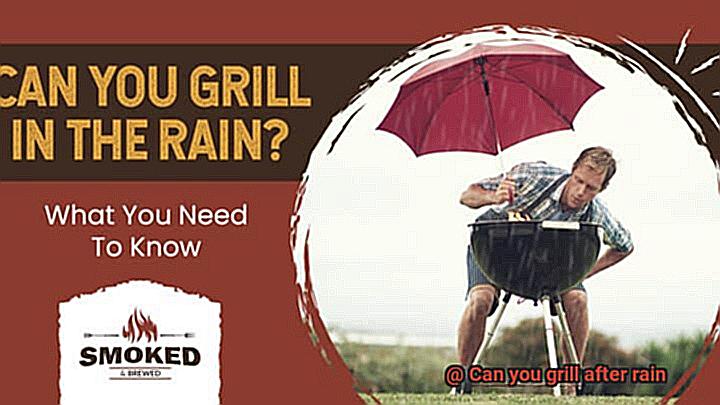
As the weather clears up and the sun comes out, many people are eager to fire up their grills and enjoy a tasty outdoor meal. However, when it comes to grilling after rain, food safety is a critical consideration that shouldn’t be overlooked. Rainwater can introduce harmful bacteria and pathogens to your grill, which can contaminate your food and cause foodborne illness. Here are some tips on how to safely grill after rain.
Firstly, it’s crucial to ensure that your grill grates are clean before you start grilling after rain. The dirt and debris left on the grill surface can harbor harmful bacteria that can easily transfer to your food. To clean your grill grates thoroughly, use a grill brush or scraper to remove any excess residue from the grates. Then wipe them down with a damp cloth or use a mild detergent solution for deep cleaning.
Secondly, make sure that your meat is cooked thoroughly before serving it. The heat from the grill will kill any bacteria that may have contaminated the meat during or after the rain. To ensure that your meat is safe to eat, use a meat thermometer to check its internal temperature and ensure it reaches the recommended safe temperature for consumption.
Thirdly, avoid cross-contamination by using separate utensils and cutting boards for raw and cooked meats. Bacteria from raw meat can easily transfer to cooked meat if you use the same tools or surfaces. It’s best to use different utensils and cutting boards for each type of meat to prevent any contamination.
Lastly, store your leftover food properly in the refrigerator within two hours of cooking. Leaving food out at room temperature for too long can cause bacteria to grow rapidly, leading to food poisoning. If you plan on reheating your leftovers, make sure that they reach an internal temperature of 165°F before consuming.
Tips for Charcoal Grills
Grilling is a beloved pastime for many, but rainy days can put a damper on outdoor cooking plans. However, with these tips, you can still use your charcoal grill after it has been rained on and create mouth-watering grilled dishes.
Clean the Grill Grates
After a rainstorm, your grill grates may be damp and covered in debris. It’s essential to clean them thoroughly before using the grill to prevent food from sticking and ensure that you get beautiful grill marks on your dishes. Use a wire brush or grill scraper to remove any buildup and wipe them down with a damp cloth.
Build a Bigger Fire
Wet charcoal briquettes can be challenging to light, so try building a slightly larger fire than usual. This will aid in drying out the briquettes and getting them hot enough to cook your food properly. Don’t forget to wait until the charcoal has turned gray before placing your food on the grill.
Use More Charcoal
Moisture in the briquettes can reduce their burning time, so you may need to use more charcoal than usual when grilling after rain. Be prepared to add more charcoal throughout the cooking process to keep the heat consistent and ensure that your food cooks evenly.
Cover Your Grill
To protect your grill from moisture and prevent rust from forming on its surface, consider investing in a grill cover. This will keep your grill dry and ready to use whenever you want to grill. If you don’t have a cover, store your charcoal in a dry place or use a waterproof cover to protect it from rain.
Adjust Cooking Time and Temperature
Grilling after rain can affect the temperature of your grill, making it necessary to adjust your cooking time and temperature accordingly. If it’s chilly outside, you may need to add extra charcoal or use a windbreak to maintain the heat in your grill. Keep an eye on your food and adjust as needed for the best results.
Tips for Gas Grills
Grilling on a gas grill after rain can be tricky, but with a few tips and precautions, you can ensure that your grilling experience is safe and successful. Here are five sub-sections to consider when grilling on a gas grill after rain:
Dry Your Grill Thoroughly
First and foremost, make sure that your grill is completely dry before using it. Wet surfaces can cause flare-ups, which can be dangerous and ruin your food. Use a dry cloth or paper towel to wipe down all surfaces, including the grates and burners, to ensure even cooking.
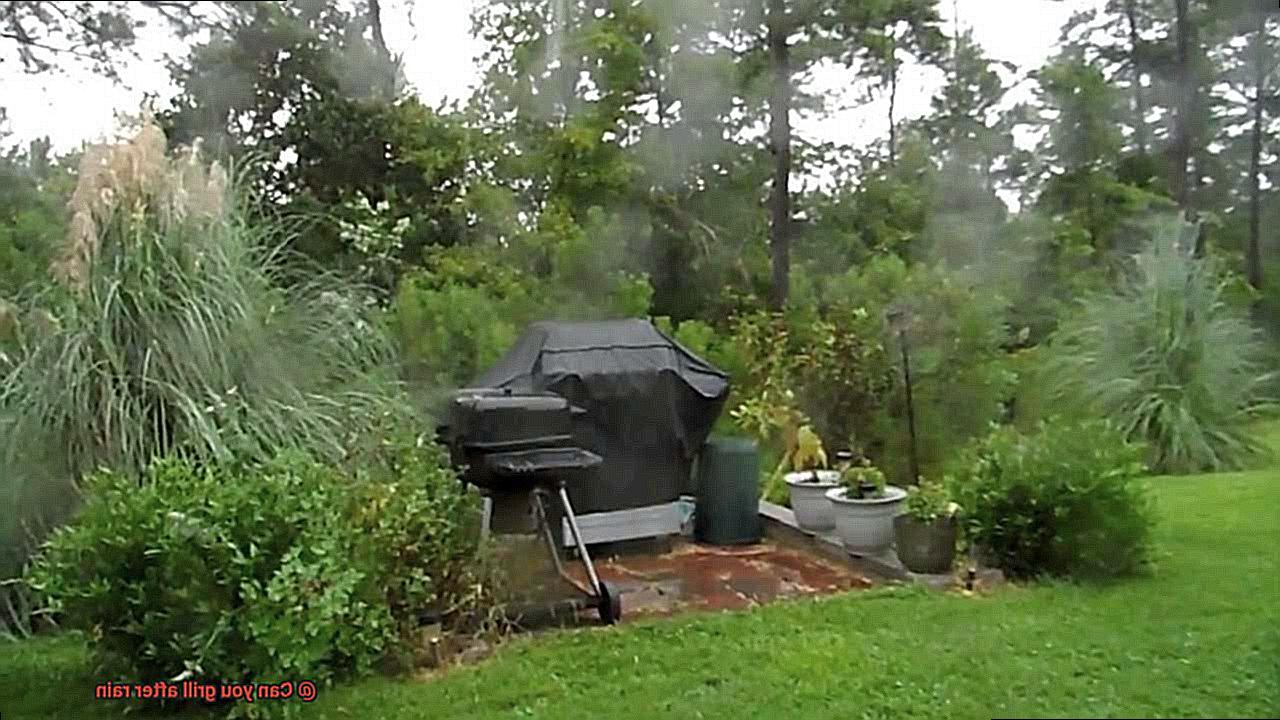
Check Your Propane Tank
Rain can cause propane tanks to rust more quickly, so it’s important to inspect them for any signs of damage or rust regularly. A damaged or rusty tank could compromise its safety or functionality, so make sure to replace it if necessary.
Invest in a Grill Cover
A grill cover is an excellent investment to protect your grill from rain and other weather conditions when not in use. Covers can also prevent rust and other forms of damage caused by moisture. Make sure to choose a cover that fits your grill properly for maximum protection.
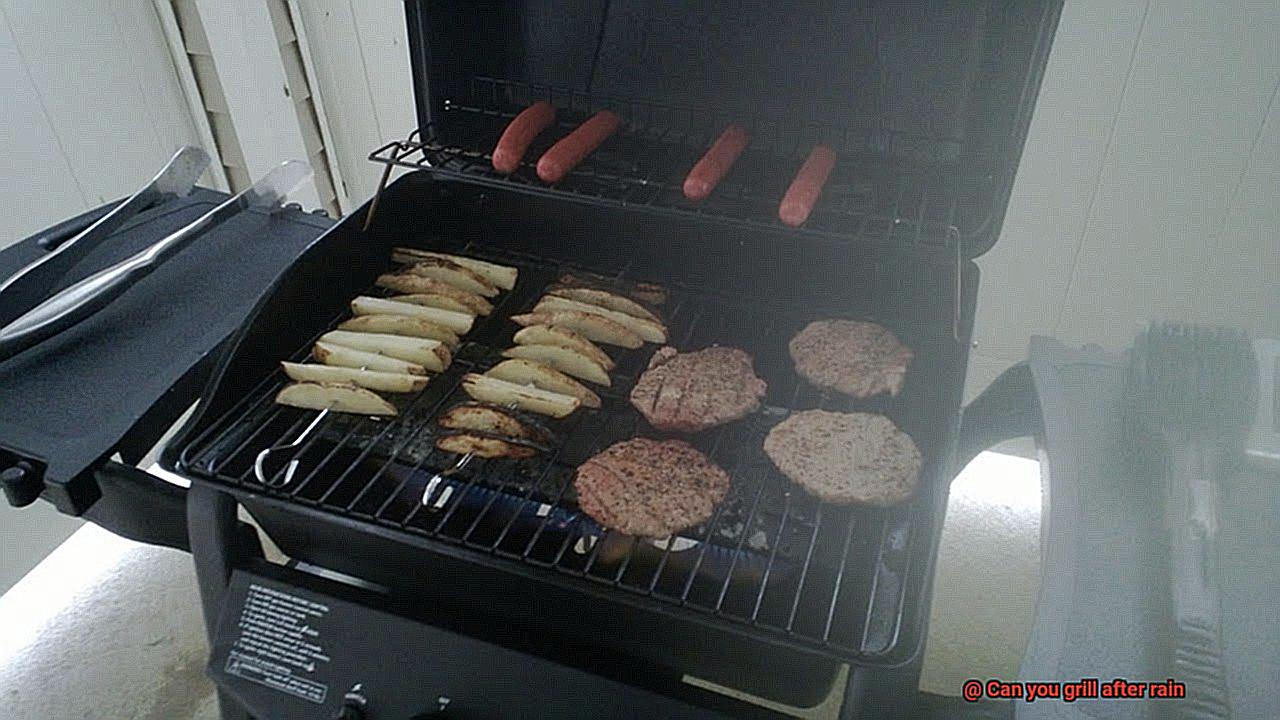
Watch Out for Flare-Ups
Wet surfaces can cause grease and other drippings to sizzle and pop, potentially causing unexpected flames. To avoid this, keep a close eye on the grill while cooking and be prepared to adjust the heat as needed. It’s also important to clean your grill regularly to prevent any build-up that could cause flare-ups.
Use a Grill Mat or Tray
Using a grill mat or tray is an excellent way to prevent food from falling through the grates while also making clean-up easier. Mats and trays come in various sizes and materials, so choose one that fits your grill and cooking needs.
Bonus Tip: Keep the Lid Closed
Keeping the lid closed as much as possible when grilling after rain can help maintain a constant temperature and prevent any moisture from getting inside the grill. This is especially important when cooking larger cuts of meat or foods that require longer cooking times.
Ea1S36Ro-GE” >
Also Read: Can a Weber BBQ Grill Get Wet If left Outside in Rain?
Conclusion
In conclusion, grilling after a downpour is possible with the right precautions and preparations. However, safety should always be your top priority when it comes to firing up your grill after rain. Wet surfaces can pose a danger, causing flare-ups or even explosions. Therefore, it’s crucial to ensure that your grill is completely dry before lighting it up.
Additionally, grilling after rain can impact the taste of your food and make it more challenging to reach the desired temperature. But don’t let that discourage you from hosting a successful cookout. By using a chimney starter or lighter fluid for charcoal grills and preheating gas grills for at least 10-15 minutes before cooking, you can ensure that your grill is hot enough to cook your food properly.
Food safety is another vital consideration when grilling after a storm. Rainwater can introduce harmful bacteria and pathogens to your grill, which can contaminate your food and cause foodborne illness. Therefore, cleaning your grill thoroughly before using it and cooking meat thoroughly before serving it are essential steps to take.
In summary, with proper cleaning, drying, covering, adjusting cooking time and temperature accordingly, you can still use your charcoal or gas grill after rain showers and create mouth-watering grilled dishes.

